By: Bethany Wight, Biologist
UF/IFAS Range Cattle Research and Education Center
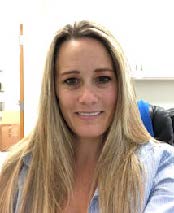
Shanna Stingu grew up in Bruce, WI, a predominantly rural area of the state. With a population of only 700, Bruce is actually not a city but a village in Rusk County. While Shanna did not grow up on a farm, she was surrounded by beef cattle and dairy operations. Growing up Shanna enjoyed playing sports, especially softball.
Shanna came to Florida for a vacation in 2006 and enjoyed the weather so much she decided to move here permanently. She became a licensed practical nurse in 2007 and worked for a physician’s office in Port Charlotte before and during her undergraduate studies.
“I have always been interested in science and learning about the earth, how things grow and change. In 2006, I was living in Alaska and witnessed the eruption of the Augustine Volcano. I wanted to know how and why it happened and this started me on my journey to pursue a degree in science.”
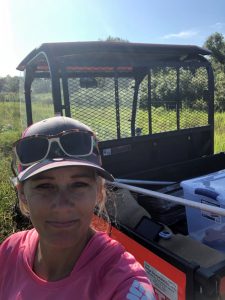
Shanna attended Florida Gulf Coast University (FGCU) and earned a Bachelor’s of Marine Science with a minor in geology in 2018. While at FGCU, Shanna was involved in several different research projects. Although her degree was in marine science her studies were more focused on general science and geology. One of the studies she assisted with involved examining rock geochemistry of the Hicks Butte Complex of the Central Cascade Mountains in Washington State. Using whole-rock and trace element geochemistry and laser ablation they were able to classify and date these Mesozoic Era rocks. Another conservation paleo-biology and ecology based study examined if oyster productivity changed from overharvesting by the Calusa aboriginals in southwest Florida. By examining growth metrics from archaeological and present day oysters they determined that while the oysters were overharvested historically by the Calusa, the oysters retained the capacity for growth and populations were able to rebound. To read the full paper visit: https://www.sciencedirect.com/science/article/pii/S2213305416301217.
During her undergraduate, Shanna at first thought she wanted to research hard rock geology, however, after taking a hybrid soils class and getting involved in estuary sediment cores to track hurricanes her interests quickly shifted to soils.
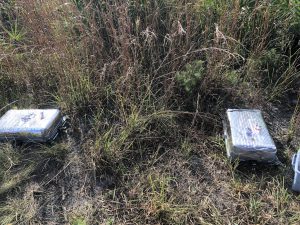
Through a friend Shanna actually visited the center prior to learning more about the center’s soil and water sciences program. Toward the end of her graduation she began researching professors and research laboratories. It came down to a tossup between a paleo-biology program at USF and the soil and water science program with Dr. Maria Silveira at the RCREC. In the summer of 2019, Shanna began her Master’s degree with Dr. Silveira in the soil and water science department.
“What interested me most about the soil program at the RCREC with Dr. Silveira was the variety of options and directions I could go with a research project, the ability to look at a variety of soil impacts and the opportunities for practical applications. I think soils need to be more understood to show how important they are to all environmental systems.”
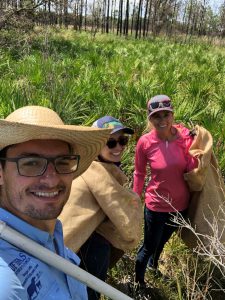
Shanna’s research will be working with the ongoing Long-Term Agroecosystem Research (LTAR) project assessing soil carbon changes and greenhouse gas emissions after burn and chop treatments, specifically carbon recalcitrance and soil nutrient cycling. It is thought that pyrogenic (post-fire) carbon in soils has a higher recalcitrance by being more stable or resistant to decomposition. Shanna’s research has several components. First biochar will be lab created using various plants most common to the research area. The second component involves an incubation study in which the rate of carbon mineralization as affected by the addition of the biochar samples is measured. The third component will be looking at the nutrient concentrations following pyrogenic organic matter additions. This will involve adding pyrogenic organic material to soil, saturating the soil, and measuring the nutrients in pore water to see how much is available to plants.
Shanna lives south of Naples, on the edge of the Everglades and enjoys hiking and being out on the water fishing during her spare time. Shanna is planning to graduate in the summer of 2021.
“Following graduation I would like to continue soil related research either by continuing onto a doctorate degree or working in a research lab. Ultimately, I want a career focused on environmental soil research in south Florida.”
Shanna’s project is funded by the USDA LTAR Project.
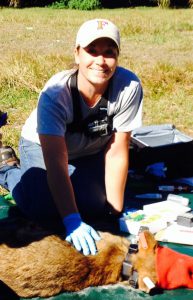
This was written by Bethany Wight, a biological scientist at the UF/IFAS Range Cattle REC in Ona, FL. If you have questions please contact her at bwight@ufl.edu.
For more information on the on the UF/IFAS Range Cattle REC’s activities in the USDA LTAR project, visit:
Assessing the Effect of Prescribed Fire Frequency and Association with Chopping on Sustainability of Southern Florida Rangelands or UF/IFAS Range Cattle REC: Part of the USDA LTAR Network
 0
0
